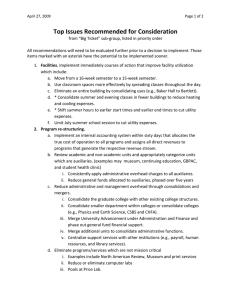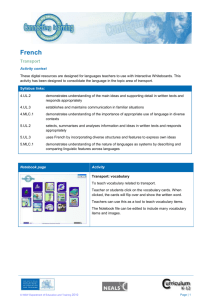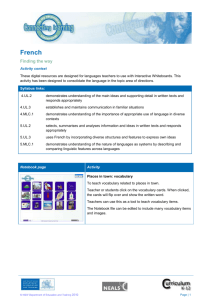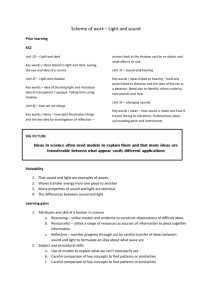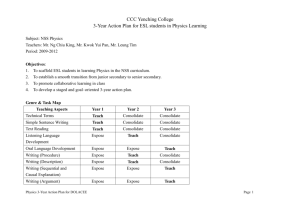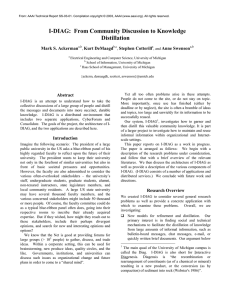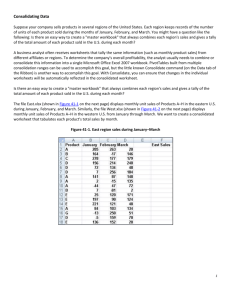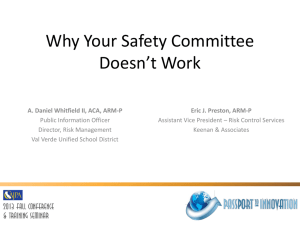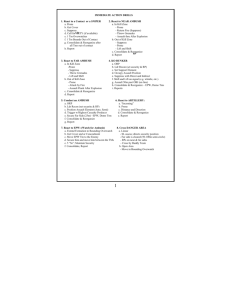Council of Chairs Presentation (Dec. 4, 2014)
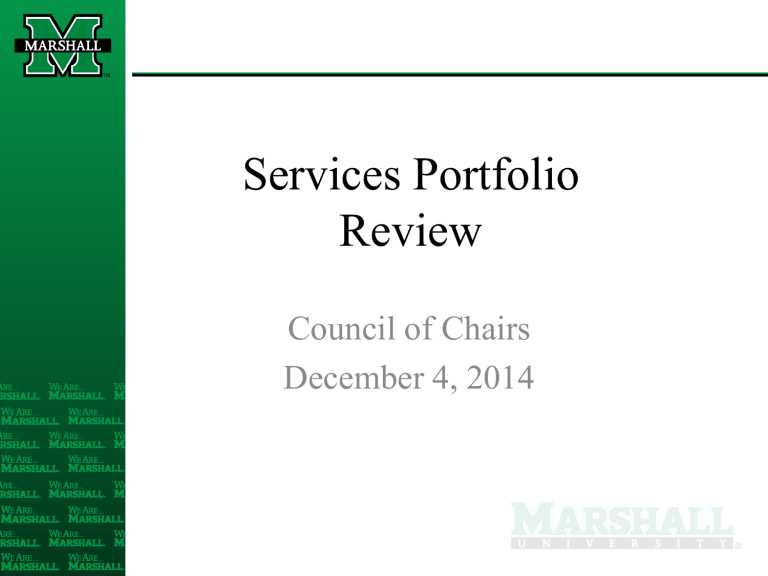
Services Portfolio
Review
Council of Chairs
December 4, 2014
Background and Project Goals
•
Service portfolio review emerged from the October 2013 campus leadership retreat. One of eight initiatives.
•
Goals
– Provide a broad review of services, reflecting a universitywide approach.
–
Focus on services that will support increased net revenue.
–
Capture cost savings for the university.
–
Enhance the level of services at the university/address “pain points”.
•
Project Target – $7-10 million in net revenue for FY16
– Justification: $5.8 million of “one-time” items used to balance
2015 budget and one year of faculty and staff raises
Steering Committee Members
•
John Maher – Co-Chair
•
Mary Ellen Heuton – Co-Chair
•
Layton Cottrill
•
Jan Fox
•
Buffy Hammers
•
Brandi Jacob-Jones
•
Gayle Ormiston
•
Virginia Painter
•
Matt Turner
Rapid Response Teams
•
Duplication of Effort -Denise Hogsett
•
Leveraging Technology -Brian Morgan
•
Facilities- Joyce Hannah
•
Auxiliaries- Karla Murphy
•
Vendors/Contracts -Allen Taylor
•
P-Card/Travel -Cammy Holley
•
Drawn from a broad cross-section of University stakeholders:
–
Faculty
–
Classified and non-classified staff
– Administration
Rapid Response Team Approach
5-Step Process
Develop Action
Plan
Prioritize
Opportunities
Review Findings
Identify
Opportunities
Conduct Due
Diligence
• Each subgroup given a charge and potential areas to review
• Opportunities developed and researched
• Prioritized recommendations by magnitude of cost savings, ease of implementation, speed of implementation and impact on service delivery
Success! –Target of $10 Million Exceeded
Recommendations – Key Focus Areas
•
Implement shared services models throughout the University to reduce cost and enhance services.
•
Consolidate operations where duplication of effort does not yield cost effective, additional service levels
•
Explore outsourcing of services where appropriate
•
Invest to drive more energy savings
•
Sell unused/under used physical assets
Recommendations – Key Focus Areas
(cont’d)
•
Consolidate building utilization during evening and summer hours
•
Leverage power of networked IT services – e.g. printing
•
Address pain points in service delivery – e.g. travel and procurement card
•
Consolidate leased spaces back to
University owned property
Quadrant Analysis
E-Course funding model & development
Evaluate outsource housekeeping/grounds
Sell University Heights property
Training requirements/efficiency
Business Center Model- Admin Services
Consolidated IT Staff within IT division
Consolidate Library Services (HSL/MUGC)
Combine summer/evening classroom bldgs
Review Auxiliary positions
Outsource selected Printing Services
Reorganize managing groups performing Campus Services
Reduce MURC payroll surcharge
Upgrade lighting fixtures (T5s and LED)
Hire Mechanical engineer (building efficiency/infrastructure audit)
Consolidate printer and copiers under managed contract
Expand use of My Buy
Hire Digital Control Specialist -Environmental controls
New Pcard reconciliation process
Termination of expiring leases
Eliminate desktop printers; move to network printers
External travel agency & related policies and procedures
Eliminate shadow systems/ licenses
Consolidate marketing and public relations functions
Eliminate student insurance
Rebid suppliers of cable services
High Impact/Difficult = $6,458,809 High Impact/Easier = $2,223,334
Lease reviews - income/rental Establish energy policy
Increasing distance learning courses - revenue enhancement Centralize testing functions
Non traditional partner contracts - revenue enhancement
Eliminate temp services/develop inhouse pool
Coordinate IT support positions across campus
Reduce memberships
Restart continuing education
Outsource Fleet Mngt
Create central fax server
Shared IT services (State level)
Consolidate recruiting functions
Improve space utilization
University website - in house and hosted by University
Licensing affiliate- increase revenue from trademarks
Upgrade video multi-plexing controller
Close underutilized bldg/areas
Enhance grant administration processes
Staggering maintenance shifts
Videoconferencing - Lync
Low Impact/Difficult = $617,819 Low Impact/Easier = $532,896
Ease of Implementation (Difficult to Easier)
Implementation of Recommendations
•
Prioritize efforts on the top left and top right decision quadrant (i.e. those initiatives with the greatest savings/net revenue opportunity)
•
Rapid response team approach
• Categorize opportunities into “buckets” to optimize implementation
Buckets for Implementation
•
Printing, faxing and IT related services
•
Auxiliaries, Facilities and leases
•
Pcard, Procurement and Travel
•
Marketing, Public Relations and Website
•
Libraries
•
Academic - includes continuing education, distance learning courses
•
Administrative and Finance – includes business center, expense reductions, temporary services/pool, student insurance
Next Steps
•
Determine implementation oversight structure-done
•
Identify Rapid Response Team leads and members-done
•
Develop process and timeframe for implementation with rpkGroup-mid-
December
•
Kickoff- January
